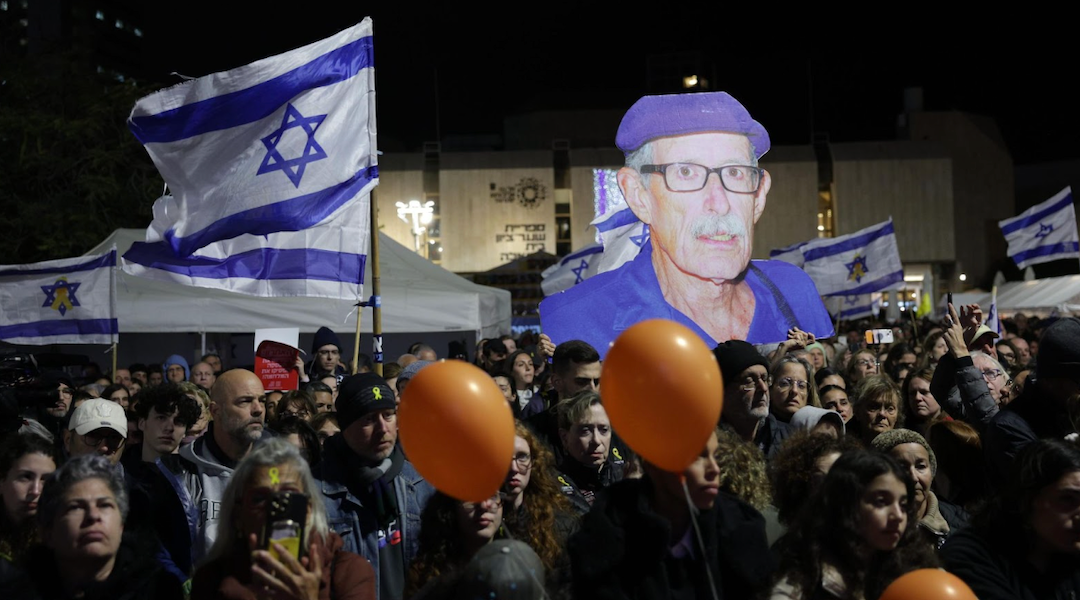His home did not survive the Eaton Fire. But one precious family heirloom did.
The Eaton Fire claimed Josh Kotler’s home but his grandmother’s menorah survived
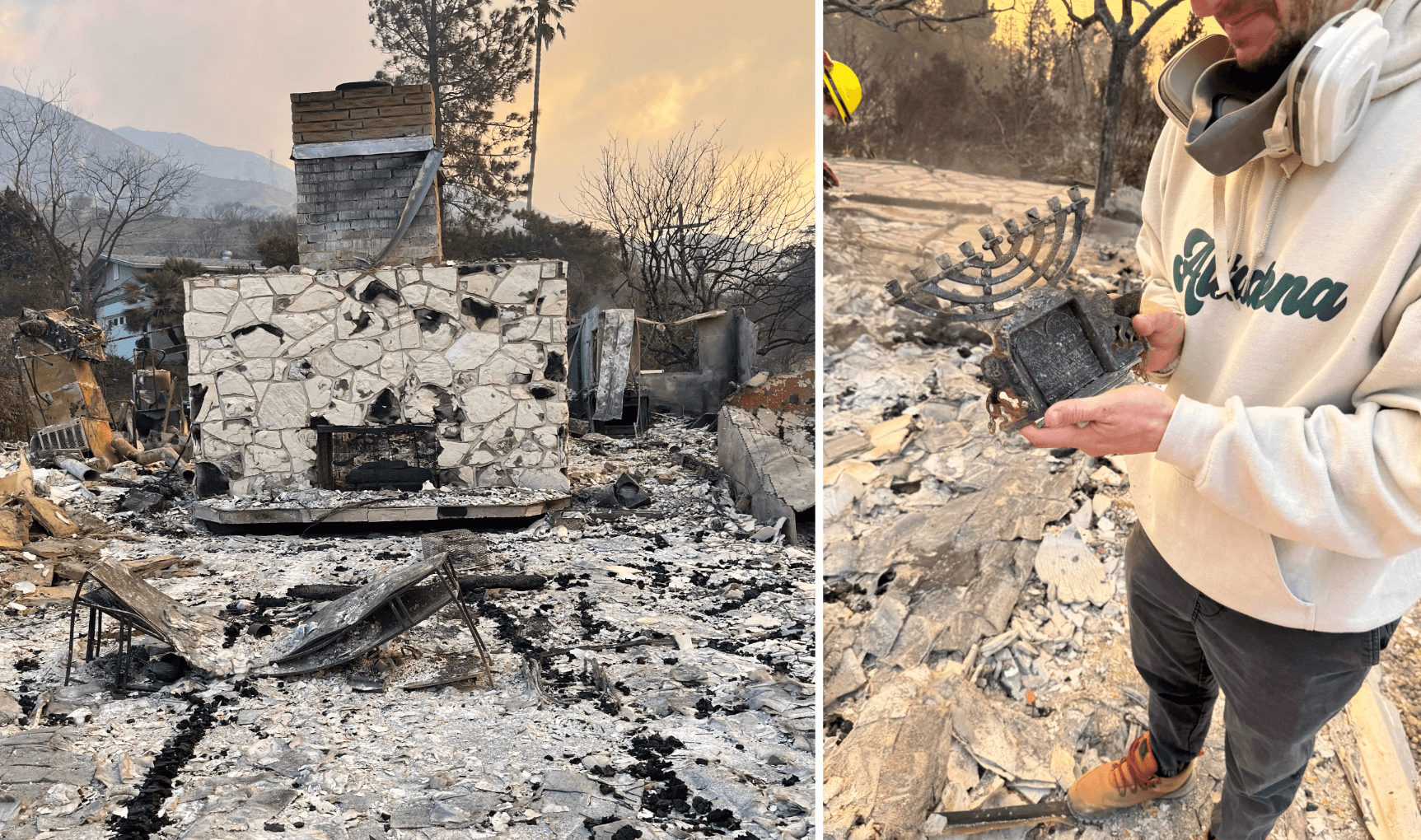
At left, the remnants of the Kotler home in Pasadena. At right, Josh Kotler holds his grandmother’s menorah, which was found in the rubble. Courtesy of Josh Kotler
Louis Keene is covering the fires in Los Angeles, where he is based. Follow him on X for live updates.
As Josh Kotler sped away from the inferno closing in on his house in Altadena, regret was already sinking in. He had left behind his grandmother’s menorah.
A Holocaust survivor, Leah Kotler had been the family matriarch, and the menorah her totem. It had been a fixture of Kotler Hanukkah gatherings since Josh, now 39, was a kid growing up in New York. He continued the tradition after she died in 2007, sending a picture of it to relatives every year on the first and last nights of the holiday.
Lighting it, Kotler said, “I always think about how strong my family must have been to survive what they went through. How proud they were to be Jewish.”
He wept as he realized he might never see it again. But his cousin — also Leah’s grandchild — assured him the menorah would be there in the morning.
Hope dimmed when Josh and his wife, Emily, received images the next morning of their entire block reduced to ash. The Eaton Fire had laid waste to northeast Los Angeles, part of a catastrophic series of blazes in the city that killed at least 24 last week. Among the more than 6,500 structures that Eaton burned was the Kotler home.
When the couple went to survey the damage later that day, fire crews were only doing perimeter examinations of each house. But Kotler enlisted one to help him sift through the rubble. With only a few minutes of her time, he guided her to where his daughters’ holiday decorations had hung just 24 hours earlier. A few moments later, he heard the firefighter pick something up. He turned, and she said two words he wasn’t used to hearing in January.
“She literally says, ‘Happy Hanukkah,’” Kotler recalled. “And passes me the menorah.”
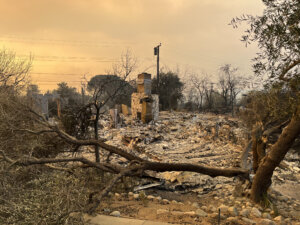
All four of Kotler’s grandparents survived the Shoah. His mother’s parents were at Auschwitz, and their memories of the concentration camps became his bedtime stories. (“People are like, ‘That’s weird.’ I was like, ‘It’s not weird. Like that’s what I grew up on.’”) But Leah and her husband, Abraham — his father’s parents — seldom discussed their experience.
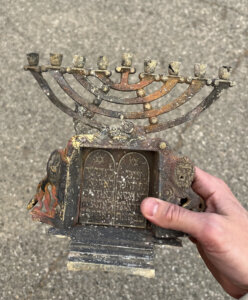
They had been part of the Bielski partisans, Jewish resistance fighters who battled the Nazis in the forests of Western Belorussia — modern-day Belarus. They rescued Jews who had fled the SS and escorted others from ghettos where they awaited deportation. The Bielskis are estimated to have saved some 1,250 Jews during the war. It wasn’t until Josh Kotler was a teenager that he learned the role Leah and Abraham had played.
“They had to do things that they didn’t necessarily want to do,” Kotler said. “They didn’t want to go and have to ambush Nazi convoys. ‘Kill people’ wasn’t on their list of things to do in life.” Neither was burying Abraham’s brother Shlomo in the woods after he fell in combat.
After the war, the Kotlers moved to Bari — a city in Southern Italy — and then immigrated to the United States. Abraham (who died in 1999) opened a kosher butcher shop on 18th Street and Avenue M in Brooklyn; Leah — “the brains of the family,” Josh says — prodded him to buy the building they had been renting, and a new family history was born.
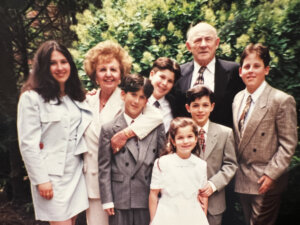
The menorah — the ritual centerpiece of a holiday that celebrates Jewish resistance — was a fitting symbol of their journey. Its unusual design places the rounded branches of the candelabra atop an ark, whose doors swing open to reveal tablets bearing the Ten Commandments. Parts of its history were hazy: Kotler knew his grandparents bought it in Israel, but he didn’t know when. And he wasn’t sure of its composition — copper, maybe, or perhaps pewter.
Those were minor mysteries, though, in comparison to the one Kotler was trying to make sense of, standing in the ashes of his home. His grandmother’s menorah — scorched but fully intact besides the ark’s doors, which were found next to it — had been the only object that survived the fire, a miracle he could not fathom. What did it all mean?
“This is the hardest time of my life,” Kotler said. “But this menorah story is bringing hope to me that we are going to survive. We are going to survive as a family. We’re going to survive as a people. We’re going to move on, and we’re going to rebuild, and we’re going to be okay.”
A message from our Publisher & CEO Rachel Fishman Feddersen

I hope you appreciated this article. Before you go, I’d like to ask you to please support the Forward’s award-winning, nonprofit journalism so that we can be prepared for whatever news 2025 brings.
At a time when other newsrooms are closing or cutting back, the Forward has removed its paywall and invested additional resources to report on the ground from Israel and around the U.S. on the impact of the war, rising antisemitism and polarized discourse.
Readers like you make it all possible. Support our work by becoming a Forward Member and connect with our journalism and your community.
— Rachel Fishman Feddersen, Publisher and CEO











